This article was medically reviewed by Sarah Gehrke, RN, MS. Sarah Gehrke is a Registered Nurse and Licensed Massage Therapist in Texas. Sarah has over 10 years of experience teaching and practicing phlebotomy and intravenous (IV) therapy using physical, psychological, and emotional support. She received her Massage Therapist License from the Amarillo Massage Therapy Institute in 2008 and a M.S. in Nursing from the University of Phoenix in 2013.
There are 15 references cited in this article, which can be found at the bottom of the page.
This article has been viewed 51,360 times.
Human growth hormone (HGH) is released by your pituitary gland and can regulate your height, weight, and other bodily properties. If you are interested in gaining muscle, reducing fat, or strengthening your bone density, then increasing your HGH levels might be helpful. To boost your HGH, start by staying in a relaxed and calm mindset. Take care of your body by getting enough sleep and working out regularly. Eat a diet high in protein and complex carbohydrates. Consult with your doctor as well. Be aware that using HGH can increase your risk of certain cancers and cause other harmful side effects in healthy adults, although it may not have these effects in adults with a growth hormone deficiency.[1]
Steps
Making Lifestyle Changes
-
1Relax. Read a good book, take a long bath, or go on a walk. Meditate and practice breathing techniques. Watch a funny movie or go to a comedy club. Surround yourself with funny people and laugh often. Chronic or continual stress reduces the presence of HGH in the body.[2]
- The very process of laughing has a positive effect on the body and increases HGH. People watching a funny movie can even anticipate a rise of up to 87% in their HGH.[3]
- One way of gauging stress could be to take your blood pressure on a daily basis. If you invest in a blood pressure cuff, then you can take a baseline reading and go from there. If you reach a consistent blood pressure of 120/80, then you are likely succeeding in relaxing and your HGH may boost as a result.[4]
-
2Get enough sleep. Your level of HGH is directly connected to your ability to get to REM, or deep sleep. Try to get at least 8 hours of undisturbed sleep per night. Create a relaxing routine in the evening, such as reading a book. Avoid playing with electronics which can expose you to blue light and lessen the quality of sleep.[5]
- You can also reduce your caffeine intake, which might help you to fall asleep faster and deeper.
- As you sleep, your body releases intervals of GH (growth hormone). If you miss hours of sleep, then you miss GH bursts.
Advertisement -
3Lower your body fat percentages. Gaining muscle and losing fat can positively impact your HGH levels. Body fat inhibits the production of HGH and belly fat is especially problematic.[6] Try to lose weight by eating a healthy, balanced diet and working out at least three times a week. Resistance exercises can be particularly helpful at trimming your mid-section.[7]
- The presence of extra abdominal fat can lower your HGH by almost half the average amount.[8]
- To gauge your percentage of body fat, you can visit a personal trainer or invest in a body fat caliper. Talk with your doctor about how to accurately measure using the caliper.
-
4Do interval training. Create a work-out plan where you go through 30-second bursts of intense activity followed by brief rest periods. You can include both challenging cardio and weight routines as part of your interval workout. Breaking a sweat can be a sign of a particularly effective interval routine.[9]
- Interval workouts elevate HGH because the pituitary gland boosts production to assist with muscle recovery.
-
5Monitor your progress. Make an appointment with your doctor to take your HGH readings at the start of this process and at monthly or bi-monthly intervals thereafter. This will help you to know whether or not you are making appropriate progress. You can also pay close attention to your body to see if you have extra energy or if you are putting on muscle easier as these are indicators of HGH increases.
Taking a Medical Approach
-
1Meet with a doctor. Make an appointment with your general practitioner or an endocrinologist. They will likely run a series of blood tests to determine if you are GH deficient. Sometimes low GH levels can be connected with other conditions as well, such as Turner Syndrome. Your doctor can also discuss possible safe treatment and care options with you.[10]
- Your doctor may take multiple blood samples to test for insulin-like growth factor 1 (IGF-1) levels.[11]
- Keep in mind that it is normal for your GH levels to lower as you age.
-
2Get injections. GH injections are available by prescription if you are diagnosed by a doctor. They are given via a pen-like device and are relatively pain-free. The injections are usually given around bedtime and are usually successful at boosting the production of GH overnight. Injections may be combined with oral supplements as part of a larger GH therapy program.[12]
- Be aware that GH injections provided outside of a doctor’s prescription are illegal and highly dangerous.[13]
-
3Take hormonal supplements. You can also take supplements as part of a broader hormonal therapy program. You will want to discuss this with your doctor and they can either write you a prescription or direct you toward certain brands. Some amino acid supplements, such as arginine, come in an oral form. You may need to take a higher dose in order to see results, so make sure to consult with a doctor for safety.[14]
- For example, a sample dosage of arginine could be between five to nine grams after each work-out session.[15]
- Before you start supplements, your doctor should do a complete blood count. As you take the supplements, visit your doctor to monitor your liver enzymes, just in case there is a problem.
-
4Beware of scams. There is no one pill that is an immediate HGH cure-all. The same goes for any creams advertised as an instant GH boost. Creams are considered only minimally effective at boosting GH. When in doubt, talk with your doctor about any treatments and verify that they are medically sound before proceeding.[16]
Making Dietary Changes
-
1Keep your insulin levels low. High insulin levels prevent your body from releasing GH. Eat foods that rank low on the glycemic index, such as complex carbohydrates. Avoid foods that are composed of simple sugars, such as most cookies or cakes. Make a point to especially avoid any sugar-laden snacks immediately before and after a work-out.
- Lean proteins, such as chicken or lean cuts of beef, help to balance out the absorption of glucose into the blood, keeping your insulin levels down. Fiber-rich foods, like broccoli or beans, are good options, too.
- Also, be sure to avoid consuming any sugary snacks before you go to sleep.[17]
-
2Get your vitamin D. You can get your vitamin D by eating certain foods, such as salmon, by spending time in the sun or through a vitamin pill. Talk with your doctor about which method, or combination, might work the best for you. Vitamin D deficiency can lead to a lowered amount of numerous hormones, including GH.[18]
- Some foods that are rich in vitamin D include tuna and egg yolks. Many dairy products are also fortified with vitamin D, such as milk and yogurt.[19]
-
3Eat amino acids. Look for foods that contain ample amounts of protein, such as dairy products and meats. Chicken, steak, cheese, and yogurt are all good amino options. When your amino acid levels are high, your body boosts the production of GH.[20]
-
4Eat protein post-workout. Timing of your meals and snacks is particularly important. Get a GH boost by consuming a protein-rich snack within 30 minutes before or after a workout. You can drink a yogurt shake or even eat a boiled egg. This protein will give your body the fuel to maximum muscle breakdown and regeneration, prompting GH increases.[21]
-
5Monitor your late-night meals. Try not to eat at least one hour prior to going to bed, as this will allow your body to fully process your food. Or, if you simply cannot give up late-night snacking, try to give your body additional fuel in the form of complex carbohydrates or proteins. Go for combination snacks, such as an egg and wheat bagel sandwich.[22]
-
6Try intermittent fasting. This is a diet plan where you take large breaks between meals. For example, you may fast during the entire day and eat only at dinner time, or you may decide to only have one meal in the morning and one meal in the evening. This diet change can help to burn off fat and keep insulin levels under control. However, this can be a controversial method, so make sure to get your doctor’s OK before proceeding.[23]
Expert Q&A
-
QuestionDo whey protein shakes and niacin pills contain HGH?
 Sarah Gehrke, RN, MSSarah Gehrke is a Registered Nurse and Licensed Massage Therapist in Texas. Sarah has over 10 years of experience teaching and practicing phlebotomy and intravenous (IV) therapy using physical, psychological, and emotional support. She received her Massage Therapist License from the Amarillo Massage Therapy Institute in 2008 and a M.S. in Nursing from the University of Phoenix in 2013.
Sarah Gehrke, RN, MSSarah Gehrke is a Registered Nurse and Licensed Massage Therapist in Texas. Sarah has over 10 years of experience teaching and practicing phlebotomy and intravenous (IV) therapy using physical, psychological, and emotional support. She received her Massage Therapist License from the Amarillo Massage Therapy Institute in 2008 and a M.S. in Nursing from the University of Phoenix in 2013.
Registered Nurse Whey protein shakes and niacin pills do not contain HGH. Drinking whey protein shakes or eating protein after a workout, however, may help you boost your own HGH production. Niacin may also help you increase your own HGH.
Whey protein shakes and niacin pills do not contain HGH. Drinking whey protein shakes or eating protein after a workout, however, may help you boost your own HGH production. Niacin may also help you increase your own HGH.
Warnings
- Make sure to only consume legal materials in your efforts to boost your GH levels. Illegal products are unregulated and can do far more harm than good.⧼thumbs_response⧽
- HGH may increase your risk of cancer, heart disease, or diabetes.⧼thumbs_response⧽
- Side effects of HGH include carpal tunnel, insulin resistance, swollen arms and legs, joint and muscle pain, and enlarged breast tissue in men (gynecomastia).[25]⧼thumbs_response⧽
- HGH is on the World Anti-Doping Agency's prohibited list. This means that you cannot take it if you compete in sports.⧼thumbs_response⧽
References
- ↑ https://www.ncbi.nlm.nih.gov/pubmed/27835910
- ↑ http://elitemensguide.com/increase-growth-hormone-naturally/
- ↑ https://www.sciencedaily.com/releases/2009/04/090417084115.htm
- ↑ http://www.mayoclinic.org/diseases-conditions/high-blood-pressure/in-depth/blood-pressure/ART-20050982
- ↑ https://authoritynutrition.com/11-ways-to-increase-hgh/
- ↑ https://www.ncbi.nlm.nih.gov/pubmed/19723558
- ↑ https://authoritynutrition.com/11-ways-to-increase-hgh/
- ↑ https://www.ncbi.nlm.nih.gov/pmc/articles/PMC2690428/
- ↑ http://www.mensfitness.com/nutrition/supplements/unlock-your-potential-how-to-boost-your-hgh-levels
- ↑ http://www.chp.edu/our-services/endocrinology/resources/endocrinology-patient-procedures/growth-hormone-treatment#sthash.jl4wUwEW.dpuf
- ↑ https://www.webmd.com/a-to-z-guides/growth-hormone#1
- ↑ http://www.chp.edu/our-services/endocrinology/resources/endocrinology-patient-procedures/growth-hormone-treatment#sthash.jl4wUwEW.dpuf
- ↑ http://www.mensfitness.com/nutrition/supplements/unlock-your-potential-how-to-boost-your-hgh-levels
- ↑ https://breakingmuscle.com/learn/what-women-need-to-know-about-growth-hormone-and-how-to-maximize-it
- ↑ http://www.mensfitness.com/training/how-naturally-raise-your-hgh-levels
- ↑ http://www.mensfitness.com/nutrition/supplements/unlock-your-potential-how-to-boost-your-hgh-levels
- ↑ http://www.mensfitness.com/nutrition/supplements/unlock-your-potential-how-to-boost-your-hgh-levels
- ↑ http://www.menshealth.co.uk/food-nutrition/muscle-foods/foods-boost-HGH
- ↑ https://ods.od.nih.gov/factsheets/VitaminD-HealthProfessional/#h10
- ↑ http://www.mensfitness.com/training/how-naturally-raise-your-hgh-levels
- ↑ https://breakingmuscle.com/learn/what-women-need-to-know-about-growth-hormone-and-how-to-maximize-it
- ↑ https://authoritynutrition.com/11-ways-to-increase-hgh/
- ↑ https://authoritynutrition.com/11-ways-to-increase-hgh/
- ↑ http://www.chp.edu/our-services/endocrinology/resources/endocrinology-patient-procedures/growth-hormone-treatment#sthash.jl4wUwEW.dpuf
- ↑ https://www.mayoclinic.org/healthy-lifestyle/healthy-aging/in-depth/growth-hormone/art-20045735?pg=2
About This Article
Maintaining healthy HGH levels can help you to gain muscle, reduce fat, and strengthen your bone density. You can increase your HGH levels by eating a healthy, balanced diet and working out at least 3 times a week. Try to avoid foods with simple sugars, like cookies, cakes, and soda, and eat plenty of wholegrains, vegetables, and lean protein instead. A lack of sleep can reduce your HGH levels, so aim to get 8 hours of shuteye a night. It’s also important to de-stress every day, since too much stress can lower your HGH levels. Set aside time to have a relaxing bath, read a book, or meditate. Low HGH levels can sometimes be caused by underlying conditions, but if a test shows you have low HGH, your doctor will talk to you about your treatment options. For more advice from our Medical co-author, including how to reduce your HGH levels with supplements, read on.

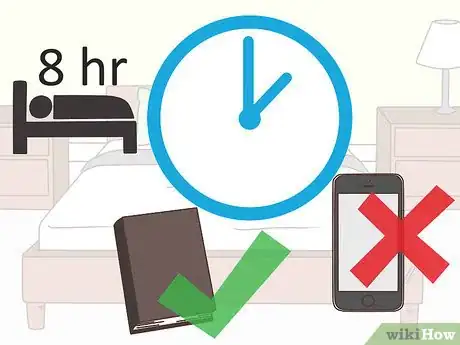

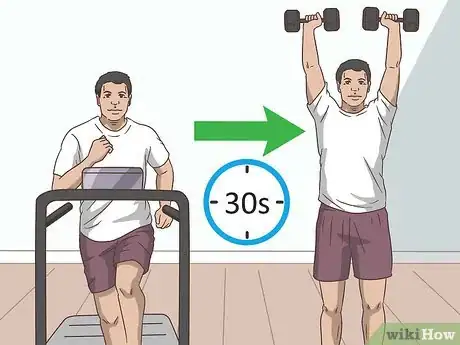


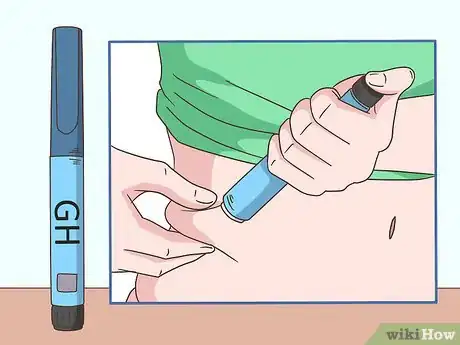



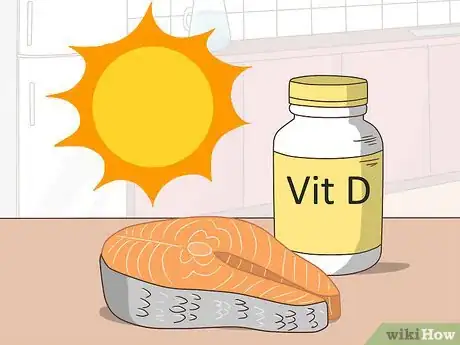
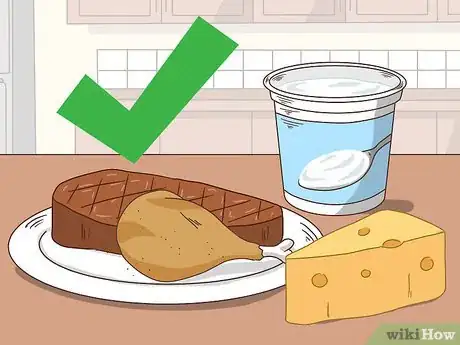
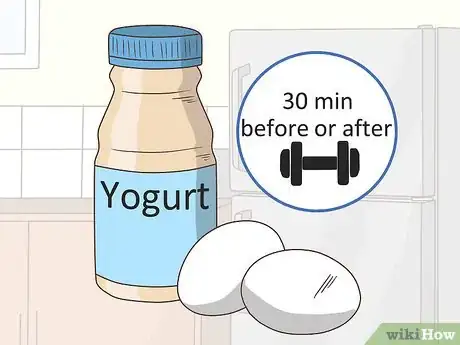
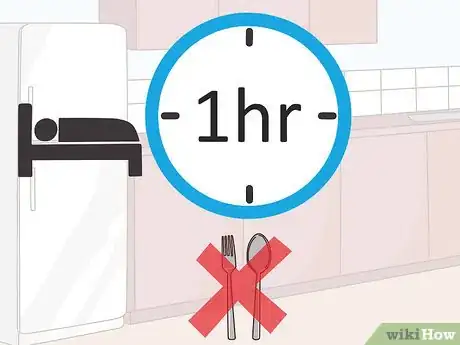
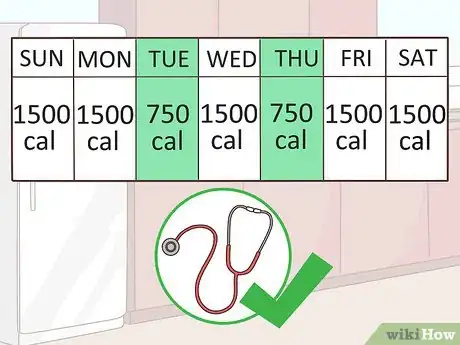



-Step-12-Version-2.webp)
















-Step-12-Version-2.webp)


































